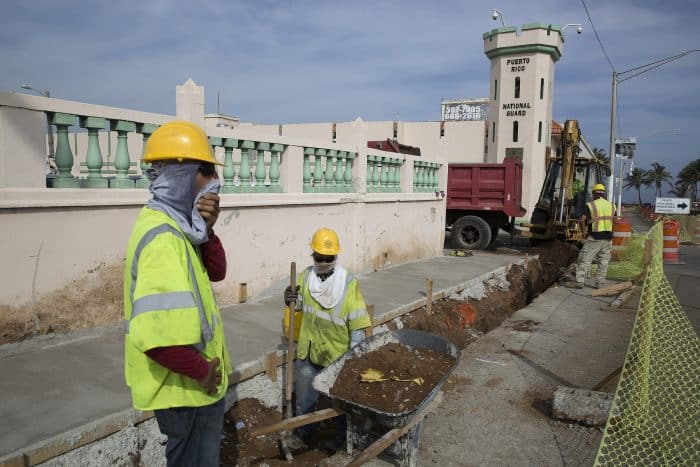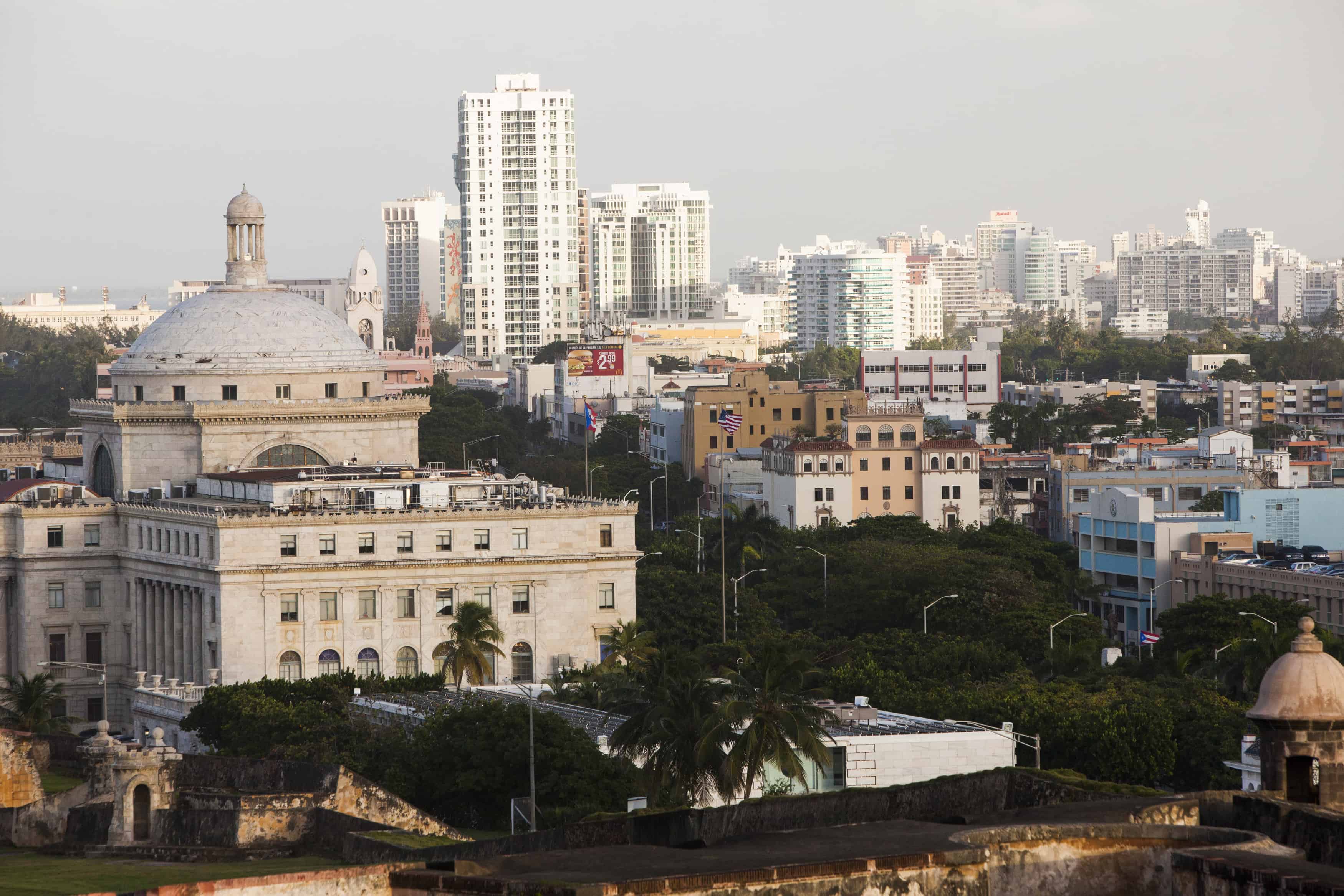The Puerto Rico governor Alejandro Garcia Padilla on Monday portrayed his territory’s economic condition as even more dire than previously revealed, and in a televised address appealed to Washington to make unprecedented “concrete” changes in bankruptcy rules to help rescue the island’s finances.
Groaning under at least $73 billion in debt, Puerto Rico — which is being called “America’s Greece” — is staggering down a path towards default, a scenario that could ripple across cities and states that depend on bonds for building everything from schools to stadiums.
“This is not about politics,” said Garcia Padilla. “It’s about math.”
The territory’s plight is also a potentially explosive issue in Washington, where Congressional Republicans mostly oppose any step that would allow Puerto Rico to seek bankruptcy protection to restructure its debts and clean up its fiscal mess. Meanwhile, the White House has offered only modest assistance in the roughly three years of crisis talks and has avoided taking any position on whether Puerto Rico could resort to bankruptcy for itself or its government-owned corporations.
With pressure mounting to avoid a default by the government of Puerto Rico, White House spokesman Josh Earnest urged for the first time on Monday that Congress “take a look at” whether to give the territory’s financially-strapped government-owned corporations — most importantly its electric utility — the option of bankruptcy protection to restructure their budget and debts.
“We cannot permit that they force us to choose between paying our police, our teachers, our nurses or paying the debt,” Padilla said.
U.S. states and Puerto Rico are barred from seeking bankruptcy protection, but cities and other municipalities can. Chapter 9 of the bankruptcy code allows a company or municipality to get new financing from markets while continuing to function as old debts are restructured or written down. It was used recently by Detroit, for example.
The Treasury Department issued a cautious statement saying only that it supported a “long-term economic and fiscal plan,” “a sustainable path,” and “an agenda for economic revitalization.” It said it would “continue to share its expertise with the local officials.”
“That’s great but it’s not addressing the fundamental issue,” said one person involved in negotiations between Puerto Rico and its creditors who spoke on condition of anonymity to preserve working relationships. “The right answer, if you were a rational policy maker looking at a territory you acquired in 1898, would be to give a federal judge supervision through extending chapter 9 and then Puerto Rico would have acess to financial markets again,” the person said.
Earnest said the Transportation Department recently “identified” $750 million in credits from toll roads that should go to Puerto Rico, but a source familiar with the program said the money would only be spent over decades. Earnest also cited the Energy Department, which has helped identify ways the electric utility, which burns oil, could save money and lower rates, but it does not have funds to help the costly conversion to cheaper fuels.

The need for radical restructuring is growing as Puerto Rico’s economy shrinks and obligations grow.
A report co-written by Anne Krueger, a former number two official at the International Monetary Fund, said that the territory’s finances were in worse shape than believed previously. The report, issued on Monday, said deficits run up by 150 different agencies and $300 million to $400 million of capital expenditures annually were among “missing items” that understated the island’s true budget deficit. The government also failed to count boxes of unpaid invoices for school supplies.
“For many years we have acted on this fiction that we have all these state-owned enterprises that are legally independent and financially self-sustaining,” said Sergio Marxuach, general counsel at the Center for a New Economy in San Juan. “Financially, they depend on the central government for all sorts of subsidies and loans.”
The report also noted that the government had also failed to make tough decisions, noting for example that over the past decade the number of students in school fell by 40 percent as people moved to the mainland United States while the number of teachers rose 10 percent, giving Puerto Rico one of the highest teacher-to-student ratios in the entire country. Hundreds of school buildings needed to be closed down, said the report.
The Krueger report also said that large portions of the workforce were not seeking employment because government benefits amounted to more than what a worker could earn at the minimum wage. She wrote that 40 percent of the adult population works or is looking for work, compared to 63 percent on the mainland. The rest are idle or working in the underground economy.
Earnest said “there are strong merits to having an orderly mechanism for Puerto Rico to manage the financial challenges of its public corporations if needed.” Puerto Rico’s public corporations, including the electric and water utilities, have about $10 billion of the island’s total debt. An administration official said later that the island had municipalities that could be considered for bankruptcy if they needed it.
But many congressional Republicans say that bankruptcy protection would amount to a federal bailout, but proponents of using chapter 9 say that it would require no federal funds.
Puerto Rico bonds, unlike those of any other state or municipality, are not taxable at federal, state or municipal levels in every state in the country. That has made the bonds highly sought after and widely held by bond funds; it has also lowered borrowing costs for Puerto Rico.
Opposition to giving Puerto Rico the bankruptcy option has come mostly from the biggest holders of Puerto Rico debt: Oppenheimer Funds and Franklin Templeton, each with about $5 billion of bonds issued by Puerto Rico or its government-owned corporations such as the electric and water utilities.
Bond insurers MBIA and Assured Guaranty are ultimately responsible for similar amounts, say negotiators. The share price of MBIA and Assured Guaranty plunged 23.5 and 13.35 percent respectively on Monday.
National Public Finance Guarantee Corp., an MBIA subsidiary that insures more than $4 billion in Puerto Rico bonds, “will continue to work with the appropriate parties toward a solution that addresses Puerto Rico’s significant fiscal and operational difficulties while respecting the rights of creditors,” a company spokesman said.
Major hedge funds that have bought Puerto Rico bonds at deep discounts hoping to make large profits if Puerto Rico ends up paying full face value are also lobbying Congress to block the bankruptcy option. Sources close to the negotiations between Puerto Rico and Congress say that those hedge funds include Fir Tree, Blue Mountain, Monarch, Stone Lion, and Knighthead.
Some market watchers say investors should have recognized that investing in the island, whose per-capita debt load far outstrips that of any state in the union, was a dubious risk. Despite that, “the governor’s statements that the commonwealth’s debts are ‘unpayable,’ will likely come as a surprise to many . . . bondholders who have willfully ignored the inevitability of a painful debt restructuring,” said a report from Municipal Market Advisers, a firm that tracks the municipal bond market.
On Monday, Fitch further downgraded Puerto Rico bonds, and prices for the island’s 20-year commonwealth bond fell 11 percent, driving the yield to 12.2 percent. The problems in Puerto Rico raised concern that the island’s crisis could harm the larger market for municipal bonds. But some analysts, noting that Puerto Rico’s debt problems are far more severe per capital than those of any state, disagreed.
“The commonwealth’s reckless use of debt-financed budgets is, in its breadth and depth, unique among U.S. municipal issuers,” said the note from Municipal Market Advisers, which concluded that “fears of a credit contagion from Puerto Rico are “unfounded.”
Staff writers Jonelle Marte and Max Ehrenfreund contributed to this article.
© 2015, The Washington Post






